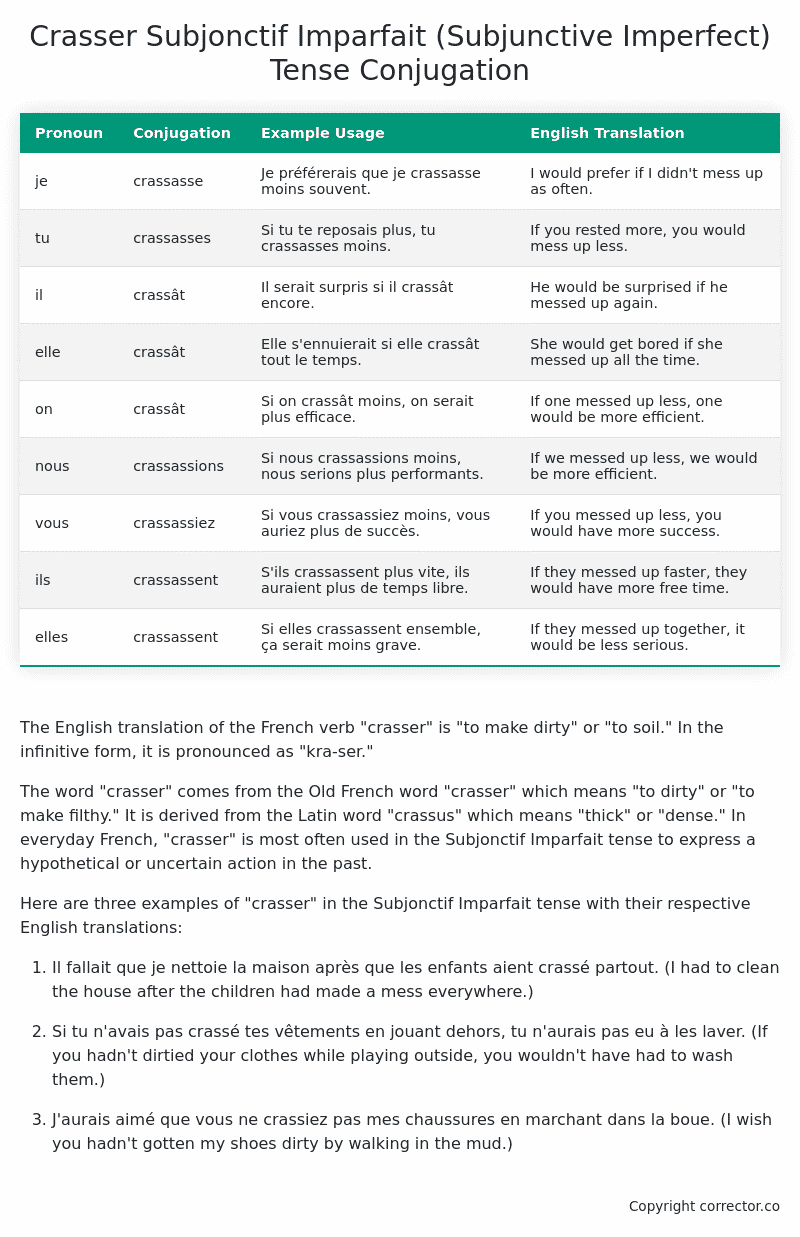Subjonctif Imparfait (Subjunctive Imperfect) Tense Conjugation of the French Verb crasser
Introduction to the verb crasser
The English translation of the French verb “crasser” is “to make dirty” or “to soil.” In the infinitive form, it is pronounced as “kra-ser.”
The word “crasser” comes from the Old French word “crasser” which means “to dirty” or “to make filthy.” It is derived from the Latin word “crassus” which means “thick” or “dense.” In everyday French, “crasser” is most often used in the Subjonctif Imparfait tense to express a hypothetical or uncertain action in the past.
Here are three examples of “crasser” in the Subjonctif Imparfait tense with their respective English translations:
-
Il fallait que je nettoie la maison après que les enfants aient crassé partout. (I had to clean the house after the children had made a mess everywhere.)
-
Si tu n’avais pas crassé tes vêtements en jouant dehors, tu n’aurais pas eu à les laver. (If you hadn’t dirtied your clothes while playing outside, you wouldn’t have had to wash them.)
-
J’aurais aimé que vous ne crassiez pas mes chaussures en marchant dans la boue. (I wish you hadn’t gotten my shoes dirty by walking in the mud.)
Table of the Subjonctif Imparfait (Subjunctive Imperfect) Tense Conjugation of crasser
| Pronoun | Conjugation | Example Usage | English Translation |
|---|---|---|---|
| je | crassasse | Je préférerais que je crassasse moins souvent. | I would prefer if I didn’t mess up as often. |
| tu | crassasses | Si tu te reposais plus, tu crassasses moins. | If you rested more, you would mess up less. |
| il | crassât | Il serait surpris si il crassât encore. | He would be surprised if he messed up again. |
| elle | crassât | Elle s’ennuierait si elle crassât tout le temps. | She would get bored if she messed up all the time. |
| on | crassât | Si on crassât moins, on serait plus efficace. | If one messed up less, one would be more efficient. |
| nous | crassassions | Si nous crassassions moins, nous serions plus performants. | If we messed up less, we would be more efficient. |
| vous | crassassiez | Si vous crassassiez moins, vous auriez plus de succès. | If you messed up less, you would have more success. |
| ils | crassassent | S’ils crassassent plus vite, ils auraient plus de temps libre. | If they messed up faster, they would have more free time. |
| elles | crassassent | Si elles crassassent ensemble, ça serait moins grave. | If they messed up together, it would be less serious. |
Other Conjugations for Crasser.
Le Present (Present Tense) Conjugation of the French Verb crasser
Imparfait (Imperfect) Tense Conjugation of the French Verb crasser
Passé Simple (Simple Past) Tense Conjugation of the French Verb crasser
Passé Composé (Present Perfect) Tense Conjugation of the French Verb crasser
Futur Simple (Simple Future) Tense Conjugation of the French Verb crasser
Futur Proche (Near Future) Tense Conjugation of the French Verb crasser
Plus-que-parfait (Pluperfect) Tense Conjugation of the French Verb crasser
Passé Antérieur (Past Anterior) Tense Conjugation of the French Verb crasser
Futur Antérieur (Future Anterior) Tense Conjugation of the French Verb crasser
Subjonctif Présent (Subjunctive Present) Tense Conjugation of the French Verb crasser
Subjonctif Passé (Subjunctive Past) Tense Conjugation of the French Verb crasser
Subjonctif Imparfait (Subjunctive Imperfect) Tense Conjugation of the French Verb crasser (this article)
Subjonctif Plus-que-parfait (Subjunctive Pluperfect) Tense Conjugation of the French Verb crasser
Conditionnel Présent (Conditional Present) Tense Conjugation of the French Verb crasser
Conditionnel Passé (Conditional Past) Tense Conjugation of the French Verb crasser
L’impératif Présent (Imperative Present) Tense Conjugation of the French Verb crasser
L’infinitif Présent (Infinitive Present) Tense Conjugation of the French Verb crasser
Struggling with French verbs or the language in general? Why not use our free French Grammar Checker – no registration required!
Get a FREE Download Study Sheet of this Conjugation 🔥
Simply right click the image below, click “save image” and get your free reference for the crasser Subjonctif Imparfait tense conjugation!

Crasser – About the French Subjonctif Imparfait (Subjunctive Imperfect) Tense
Formation
Common Everyday Usage Patterns
Interactions with Other Tenses
Subjonctif Présent
Indicatif Passé Composé
Conditional
Conditional Perfect
Summary
I hope you enjoyed this article on the verb crasser. Still in a learning mood? Check out another TOTALLY random French verb conjugation!


